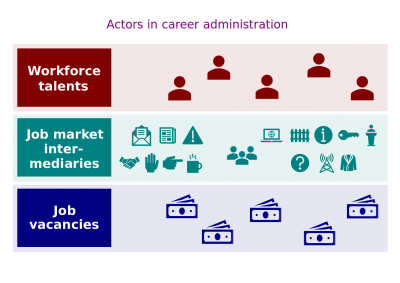Difference between revisions of "What Job Market Is"
(→Content) |
|||
| (4 intermediate revisions by 2 users not shown) | |||
| Line 1: | Line 1: | ||
[[What Job Market Is]] (hereinafter, the ''Lectio'') is the second [[lectio|lesson part]] of the '''[[Job Market Essentials]]''' [[lesson]] that introduces its participants to [[job market]] and related topics. | [[What Job Market Is]] (hereinafter, the ''Lectio'') is the second [[lectio|lesson part]] of the '''[[Job Market Essentials]]''' [[lesson]] that introduces its participants to [[job market]] and related topics. | ||
| − | [[File:Educaship-pipeline.png|400px|thumb|[[WorldOpp Pipeline]]]]This ''lesson'' belongs to the [[Introduction to Recruitment]] session of | + | [[File:Educaship-pipeline.png|400px|thumb|[[WorldOpp Pipeline]]]]This ''lesson'' belongs to the [[Introduction to Recruitment]] session of [[EmployableU Concepts]]. |
| Line 28: | Line 28: | ||
===Key terms=== | ===Key terms=== | ||
| − | : | + | :[[Job market]], [[job-market actor]], [[job-market intermediary]], [[United States Department of Labor]] |
| − | |||
| − | |||
| − | |||
| − | |||
===Closing=== | ===Closing=== | ||
| − | :Is the [[concept]] of [[job market]] explained well? --Yes/No/I'm not sure | + | :Is the [[concept]] of [[job market]] explained well? --Yes/No/I'm not sure |
'''[[Job Market Trends]]''' is the successor [[lectio]]. | '''[[Job Market Trends]]''' is the successor [[lectio]]. | ||
Latest revision as of 21:35, 29 October 2023
What Job Market Is (hereinafter, the Lectio) is the second lesson part of the Job Market Essentials lesson that introduces its participants to job market and related topics.
This lesson belongs to the Introduction to Recruitment session of EmployableU Concepts.
Content
The predecessor lectio is Professional Credentials.
Script
- The job market is the number of employment vacancies that are available in a particular place or for a particular type of work and the number of employment candidates who are able to fill these vacancies in.
- On this market, employers would like to exchange their employee compensations to one's willingness to perform employer's jobs, on the one hand, and, on the other hand, employment candidates would like to exchange their willingness to perform employer's jobs to employee compensation.
- Any actor on the job market is a job-market actor. Besides employers and workers, these actors include job-market intermediaries.
- A job-market intermediary is any legal entity that makes or indent to make employment arrangements between workers and employers that either (a) do not deal with each other directly yet or (b) need third party's help.
- Third-party recruiters are examples of the intermediaries; the government agencies that support job market actors are other examples.
- In the United States, the Department of Labor is the cabinet-level department of the United States Federal Government is responsible for the execution of federal labor laws to guarantee workers' rights to fair, safe, and healthy working conditions, including minimum hourly wage and overtime pay, protection against employment discrimination, and unemployment benefits.
- Because both employers and workers are on the job market, they both are engaged in marketing.
- Marketing endeavors of workers are called job marketing. Workers should market themselves to land a job.
- Marketing endeavors of recruiters are called vacancy marketing. Recruiters should market their employment vacancies to find qualified, able, and available employment candidates.
Key terms
Closing
- Is the concept of job market explained well? --Yes/No/I'm not sure
Job Market Trends is the successor lectio.

